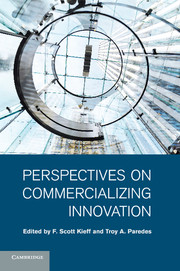Book contents
- Frontmatter
- Contents
- Contributors
- Dedication
- Acknowledgments
- Introduction
- Part I Perspectives on Theories of Intellectual Property
- Part II Perspectives on the Problems of Anticommons and Patent Thickets
- Part III Perspectives on Finance and Commercialization
- Part IV Perspectives on the University Innovation
- 13 University Software Ownership and Litigation
- 14 The Impact of the Bayh-Dole Act on Genetic Research and Development
- 15 Patents, Material Transfers, and Access to Research Inputs in Biomedical Research
- 16 Are Universities Patent Trolls?
- Part V Perspectives on International Considerations
- Index
- References
14 - The Impact of the Bayh-Dole Act on Genetic Research and Development
Evaluating the Arguments and Empirical Evidence to Date
from Part IV - Perspectives on the University Innovation
Published online by Cambridge University Press: 05 December 2011
- Frontmatter
- Contents
- Contributors
- Dedication
- Acknowledgments
- Introduction
- Part I Perspectives on Theories of Intellectual Property
- Part II Perspectives on the Problems of Anticommons and Patent Thickets
- Part III Perspectives on Finance and Commercialization
- Part IV Perspectives on the University Innovation
- 13 University Software Ownership and Litigation
- 14 The Impact of the Bayh-Dole Act on Genetic Research and Development
- 15 Patents, Material Transfers, and Access to Research Inputs in Biomedical Research
- 16 Are Universities Patent Trolls?
- Part V Perspectives on International Considerations
- Index
- References
Summary
The past two decades have witnessed a growing debate in the United States over patenting genetic products and processes. At the heart of the debate are two interrelated questions – first, whether granting patents on the results of “upstream” genetic research undermines the norms of the biological research community, and second, whether such patenting promotes or retards biomedical innovation, technology transfer, and/or the development of downstream commercial products and processes. Much of this debate has focused on the impact of a 1980 piece of legislation codified as a chapter of the U.S. patent statute and commonly known as the Bayh-Dole Act.
The Bayh-Dole Act effected a major change in U.S. policy with respect to the ownership of intellectual property rights in federally funded research. It was designed to promote technology transfer by allowing universities, small businesses, and other research institutions, in the absence of special circumstances, to retain ownership of the patent rights resulting from federally funded research, subject to a number of obligations, including an obligation on the part of universities and other nonprofit institutions to share royalties with the actual inventor. Prior to the Bayh-Dole Act, patent rights were in principle retained by the federal funding agencies themselves, though the actual patent policies of federal funding agencies varied considerably, with some agencies allowing universities to patent publicly funded research discoveries under certain circumstances. Although the Bayh-Dole Act governs the patenting of federally funded research in all fields of technology, university patenting and licensing pursuant to the act have thus far overwhelmingly involved the life sciences.
- Type
- Chapter
- Information
- Perspectives on Commercializing Innovation , pp. 435 - 488Publisher: Cambridge University PressPrint publication year: 2011
References
- 1
- Cited by



